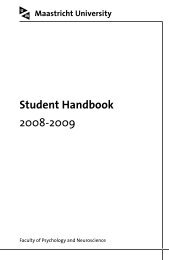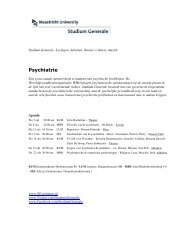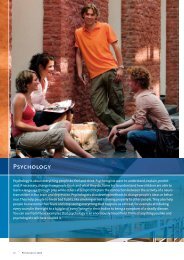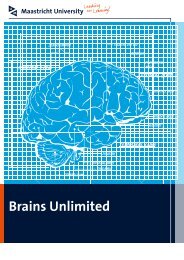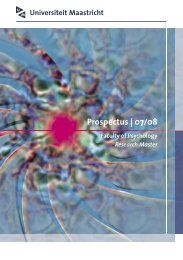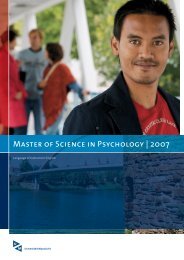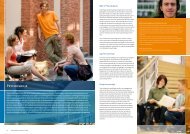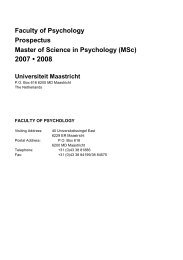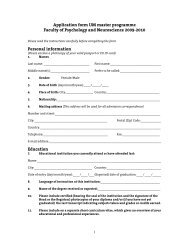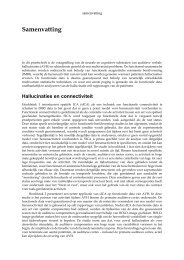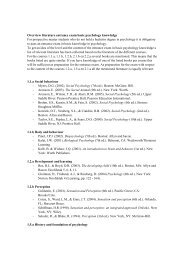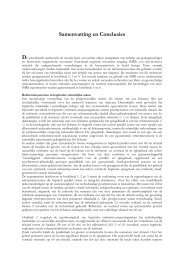Prospectus | 08/09 - Psychology and Neuroscience - Maastricht ...
Prospectus | 08/09 - Psychology and Neuroscience - Maastricht ...
Prospectus | 08/09 - Psychology and Neuroscience - Maastricht ...
You also want an ePaper? Increase the reach of your titles
YUMPU automatically turns print PDFs into web optimized ePapers that Google loves.
<strong>Prospectus</strong> Research Master <strong>Psychology</strong> 20<strong>08</strong> • 20<strong>09</strong><br />
Practical training<br />
Each course unit includes a computer practical. The assignment (e.g., analysis of<br />
real data with SPSS or LISREL) is discussed in a plenary meeting after the practical.<br />
Attendance at practicals <strong>and</strong> discussion meetings is m<strong>and</strong>atory (with 100% <strong>and</strong> 85%<br />
attendance rule, respectively).<br />
32<br />
Instructional Approach<br />
Meetings are arranged into units, consisting of lectures, self tuition sessions, computer<br />
exercises, <strong>and</strong> plenary discussions.<br />
Form of Assessment<br />
Open book, multiple choice exam consisting of questions resembling the exercises<br />
(general theory, some elementary computations, <strong>and</strong> interpretation of computer<br />
output).<br />
| 511CN Neurocognition of Literacy <strong>and</strong> Numeracy – 3 credits<br />
Coordinator: Leo Blomert, Cognitive <strong>Neuroscience</strong> (FPN), Phone 38 81949,<br />
40 Universiteitssingel East, Room 4.748, E-mail: l.blomert@psychology.unimaas.nl<br />
Description of the Course<br />
Learning to read <strong>and</strong> write is an indispensable skill in literate societies. It is therefore<br />
surprising that research into the brain mechanisms enabling literacy acquisition has<br />
hardly started. It is even more surprising if we consider that 4% of the population<br />
suffers from a specific problem in learning to read <strong>and</strong> write, despite a normal<br />
intelligence. This state of affairs may be contributed to the fact that learning to read<br />
<strong>and</strong> write <strong>and</strong> the failure thereof have been perceived for a long time as an educational<br />
<strong>and</strong> not a neurocognitive problem. But the deeper reason may be that our brains are<br />
evolutionary not prepared for learning a written language. Our brains are probably for<br />
a large part hardwired for perceiving <strong>and</strong> producing speech. Since written language<br />
connects symbols (letters) to speech sounds, it is tentative to assume that written<br />
language skills develop by building on the already established spoken language system.<br />
Development of numeracy may be an even more indispensable skill in our<br />
technological society. Again surprisingly brain research in this area of neurocognition<br />
has only very recently started. Although learning arithmetic may look as artificial as<br />
learning to read it has in fact a different evolutionary background. Animals possess<br />
basic numeracy skills, so our brains may have available basic numeracy networks, but<br />
it is as yet unclear how they contribute to the development of arithmetic <strong>and</strong> math<br />
skills. The course will focus on brain studies of literacy development <strong>and</strong> failure, e.g.,<br />
developmental dyslexia <strong>and</strong> on the development of numeracy skills <strong>and</strong> failure, i.e.,<br />
developmental dyscalculia.<br />
Literature<br />
Journal articles <strong>and</strong> book chapters.



